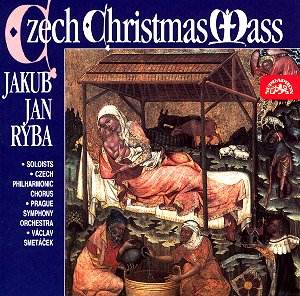Spend Christmas in Prague – a seasonal period which
stretches from mid-November until well into January, judging by the
concerts of Baroque Festive Masterpieces temptingly on offer in every
church in the city – and you will doubtless be inveigled to a performance
of Ryba’s Christmas Mass. The colloquialism of its name, Hej, mistre,
or Hey, Master is a sure indication of the kind of work it is –
a pastoral mass of charming tunefulness but decidedly unintellectual
pretensions. The notes speculate that it became popular in the 1960s
as a conciliatory sop by the government – intriguingly designated in
the sleeve note as the then atheist regime (English translation,
Communist). Certainly the score, whilst known, had remained pretty much
ignored in the National Museum and it would fit the date of this recording
– 1965, which is rather naughtily concealed from view on the case and
booklet – you’ll have to investigate the CD itself for the information
that this disc is now pushing forty years of age.
The portents for a lusty and triumphant performance
are strong. Smetacek is the conductor; Blachut is the tenor; Marie Mrazova
is contralto (well remembered from Mackerras’s Janacek opera recordings);
Jaroslava Vymazalova, who had premiered Kapralova’s Op 18 songs Vteriny
(Seconds) in Prague just after the War, is the soprano; the splendid
bass is Zdenek Kroupa, beloved in Vienna. The Mass was composed in 1796
and written in the expected form of the Ordinary but, written in Czech
and idiomatic and immediately understandable to its congregation; it
is in fact a nativity. This was hardly a unique occurrence and Ryba
had himself set Czech as a Mass as had other composers before him -
but this did represent something of a consistent if small trend in late
eighteenth century Bohemia. It’s doubly unfortunate therefore that no
texts are provided in any language. Not helpful.
To the organ-dominated accompaniment in the Kyrie Blachut
and Kroupa, whether singly or in unison, are liltingly joyous. Blachut
is rather taxed at the top of his compass but he is, as ever, passionately
commanding. Similarly Vymazalova and Mrazova, joined by Kroupa are richly
communicative – accompanied as they are by some dancing and felicitous
strings and flute. The sopranos from the Czech Philharmonic Chorus are
characteristically high flying here – pitch maintained and stridently
effective. Orchestral accompaniment to Blachut’s singing of the Graduale
is vigorously bluff whilst there is an affectionate simplicity to the
Credo, with Kroupa sounding distinctive and cavernous, like a Moravian
Malcolm McEachern. Contemplative and soothing folk fiddles caress the
Offertorium whilst the transition from the Sanctus to the Benedictus
is seamless and persuasively pliant. Maybe the sopranos are strained
by the demands of the Benedictus – simplicity doesn’t exclude demands
– but the celebratory exchanges of the concluding moments, with organ,
string and brass exchanges are bracing and resoundingly alive. The charming
little Pastoral My Nightingale, winningly sung by Helena Tattermuschova,
ends the disc.
Sound is still unimpeachable, notes are a little shaky
– no texts – and at forty-three minutes you might well feel short-changed.
It’s an intimate and affirmatory forty-three minutes though and splendidly
performed. Superbudget price.
Jonathan Woolf
